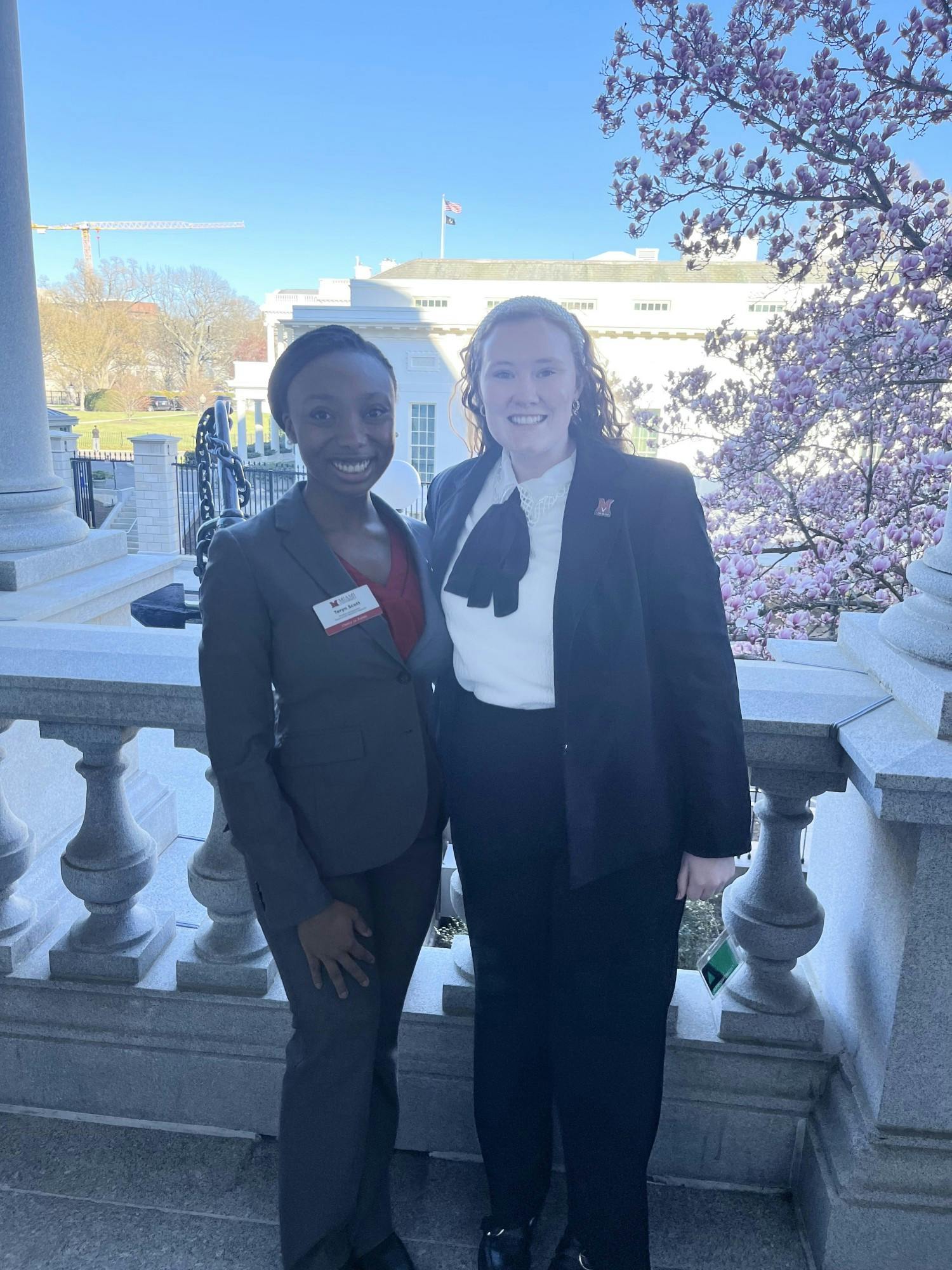When Miami University started making its campus more energy efficient in 2012, it was to save money in the wake of the 2008 financial crisis.
Ten years later, these measures have evolved into an organized strategy for decarbonization that has established Miami as a leader in campus sustainability.
In light of Miami’s sustainability achievements, two staff members and two students were invited to represent Miami in the White House forum on campus and community-scale climate change solutions on March 8.

Two students, Teryn Scott and Evelyn Morrison, attended the conference in Washington, D.C., along with two staff members.
The conference took place over two days in Washington, D.C. It included speakers from organizations like the National Science Foundation (NSF), the Department of Energy and the White House Office of Science and Technology Policy.
Sara Linder is the director of federal relations at Miami’s Office of Advancing Strategies, Partnerships, Institutional Relations and Economy (ASPIRE), an institution that connects public officials with the university. Linder was one of the staff members to attend the conference, and she explained that it was formed through a collaboration between the federal government and several universities.
“We formed an informal working group of half a dozen universities engaged in conversations with the White House,” Linder said. “We put together a proposal to the NSF, and we got approval for the conference to happen.”
Linder said the purpose of the conference was to give colleges across the country a chance to connect and share sustainability techniques with each other. The conference invited one college from each U.S. state and territory, with Miami chosen to represent Ohio.
“This conference is bringing universities from across the country to see what they’re doing on their campuses, and learning about the role the government can play in supporting universities,” Linder said. “We are learning from one another through this workshop to create a network of campuses that can rely on each other for future climate solutions.”
Enjoy what you're reading?
Signup for our newsletter
One of the reasons Miami was chosen for the conference was because of its track record in improving energy efficiency and reducing emissions.
Olivia Herron, director of sustainability at Miami, said Miami’s sustainability development was initially to save money but ended up turning the university into an unwitting sustainability pioneer.
“Back in 2012 we were coming out of the recession, and higher education wasn’t in a good place, so the university was originally saying, ‘OK, if we’re using less electricity, we’re saving money,’” Herron said. “This was over 10 years ago — at that time it was about finances, but now Miami is really good at being energy efficient and one of the leaders in the country [in sustainability].”
Herron said the combination of focusing on energy efficiency and moving to renewable energy sources such as geothermal over the past decade has helped significantly reduce greenhouse gas emissions from campus facilities, setting Miami apart from other colleges.
“If we put all sources of energy together, we have reduced the greenhouse gas emissions from our energy system by 55% since 2008,” Herron said. “A lot of universities have interim goals of 30% [greenhouse gas reduction] by 2030, so we have definitely surpassed them in that area.”
Teryn Scott, a junior majoring in diplomacy and global politics and geography & sustainable development, was one of the two Miami students that attended the conference. She said Miami’s position as a college campus also gave it unique opportunities to test out sustainability solutions.
“Universities are like living laboratories — colleges provide a test bed and proof points for climate action,” Scott said. “Many campuses are like small cities, and have similar challenges for mitigation, adaptation and resilience. At Miami, we’re testing out new and innovative technologies to see where they work, how they work and what benefits they provide.”
Scott also said it was inspiring to listen to the speakers at the conference and participate in breakout discussions.
“It was great to be in the room where all these great minds come together and talk about problems that affect not only our generation but generations to come,” Scott said. “It’s good as a student to discuss areas where we can improve communities and improve global society as a whole, and I felt empowered as a student participating in this conference.”

Randi Thomas, vice president of ASPIRE at Miami University, participated in a panel at a White House forum on sustainability.
Randi Thomas, vice president of ASPIRE and a panelist at the conference, said the engagement of Scott and Evelyn Morrison, the other student that went, with sustainability leaders was his favorite part of the conference.
“I was so proud of our students and their participation — they rocked it,” Thomas said. “[Sustainability] is such an important issue and to have our students involved and engaged at that level is very fulfilling.”
Thomas said the conference was a great experience that gave him hope for college sustainability in the future.
“We learned a lot, and we’re very proud of the work that Miami is doing under [President Crawford’s] leadership,” Thomas said. “To have all those great minds in the room — not just on campus, not just in the U.S., but globally — gives me great hope and solace in respect to climate change.”




